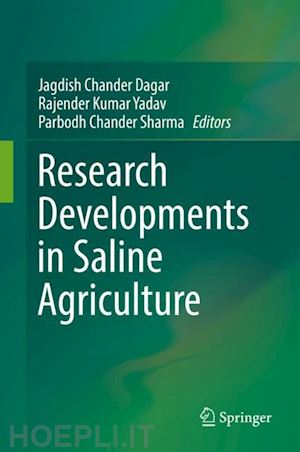
Questo prodotto usufruisce delle SPEDIZIONI GRATIS
selezionando l'opzione Corriere Veloce in fase di ordine.
Pagabile anche con Carta della cultura giovani e del merito, 18App Bonus Cultura e Carta del Docente
Soil and water salinity is a major challenge for the agricultural community and policy makers in terms of meeting the burgeoning population’s demand for food and other agricultural commodities. In coastal regions, climate change and sea level rise will aggravate the problem with more and more areas becoming saline due to intrusion of sea water. As such there is a pressing need for modern tools and innovative techniques for the identification of salty soils and poor-quality waters, crop production, soil reclamation and lowering the water table in waterlogged areas. Tackling next-generation problems such as contamination of soil and underground water due to fluoride and arsenic, as well as developing multi-stress tolerant crops is also a high priority. Further, techniques for domesticating halophytes, mangrove-based aquacultures, using seaweed cultures as agricultural crops and integrated farming systems need to be perfected. This book addresses all these aspects in detail, highlighting the diverse solutions to tackle the complex problem of salinity and waterlogging and safer management of poor-quality waters. With chapters written by leading experts, it is a valuable resource for researchers planning future investigations, policy makers, farmers and other stakeholders, and for students wanting insights into vital issues of environment.
Dr Rajender Kumar Yadav is currently Principal Scientist & Head of the Division of Soil and Crop Management, ICAR-Central Soil Salinity Research Institute, Karnal, India. An agronomist by training, he has published 53 research papers in high-impact, peer-reviewed Journals, 46 papers in the proceedings of national and international conferences/symposia and book chapters and written 10 books/bulletins. Dr Yadav received the National Groundwater Augmentation Award (Ministry of Water Resources, Govt. of India), Ganesh Sankar Vidyarthi Puruskar (ICAR), and a Commonwealth Scientific and Industrial Research Organization (CSIRO) Australia fellowship. He is a fellow of the India Society of Agronomy and is involved in a number of major national and international projects. He is a fellow and General Secretary of the Indian Society of Soil Salinity & Water Quality and an member of several scientific professional societies.
Dr Parbodh Chander Sharma is currently Director of the Central Soil Salinity Research Institute, Karnal (India), and was previously program leader for improvement of rice, wheat, Indian mustard and chickpea for salt tolerance and high yield as Head, Division of Crop Improvement. He has made significant contributions to our understanding of the physiological mechanisms under salinity stress in different crops and was involved in developing salt-tolerant, high-yielding genotypes of Indian mustard (CS 56, CS 58 and CS 60), rice (CSR 46) and wheat (KRL 283), as well as improving three popular mega varieties of rice (Pusa 44, PR 114 and Sarjoo 52) for salinity tolerance by introgression of SALTOL QTL following molecular marker assisted backcross breeding. He was also involved in developing crop and resource management practices for sustainable future cereal-based systems in line with conservation agriculture. He has been awarded fellowships of three professional societies and has been the President of the Indian Society of Soil Salinity and Water Quality since 2016. He has published more than 100 research papers in peer-reviewed, research journals.










Il sito utilizza cookie ed altri strumenti di tracciamento che raccolgono informazioni dal dispositivo dell’utente. Oltre ai cookie tecnici ed analitici aggregati, strettamente necessari per il funzionamento di questo sito web, previo consenso dell’utente possono essere installati cookie di profilazione e marketing e cookie dei social media. Cliccando su “Accetto tutti i cookie” saranno attivate tutte le categorie di cookie. Per accettare solo deterninate categorie di cookie, cliccare invece su “Impostazioni cookie”. Chiudendo il banner o continuando a navigare saranno installati solo cookie tecnici. Per maggiori dettagli, consultare la Cookie Policy.